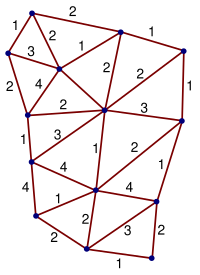自旋網路
量子力學中,自旋網路是一種圖表,用以表示粒子與量子場之間的的交互作用與狀態。以數學的出發點來看,這些圖案是一種簡明方法,可代表多線性函數以及矩陣群眾多表示之間的關聯函數。此圖案記號往往能簡化計算,以其能代表複雜的函數。自旋網路的發明一般是歸因於羅傑·潘洛斯於1971年的貢獻,[1]然而在此之前已有類似的圖樣方法。

透過卡洛·羅威利, 李·斯莫林、霍爾黑·普林, 羅多佛·甘比尼等多位研究者的努力,自旋網路被用於量子重力理論。自旋網路亦可被用在數學中局域規範轉換不變性的連通空間,用以建構特定的泛函。
潘洛斯原始定義
編輯1971年,羅傑·潘洛斯提出一種圖形表示法,其中每個線段代表一個「單元」(基本粒子或粒子的複合系統)之世界線。三條線段匯聚在一個頂點。頂點可以詮釋為一個事件;在此事件中,一個單元分裂成兩個單元,或兩個單元碰撞合而為一。當一圖表中所有的線段都在頂點會合,則此圖為「封閉自旋網路」。時間以單一方向行進,比如從圖的底部走到圖的頂部。然而在封閉自旋網路的例子,時間行進的方向對於計算不構成影響。
每一線段標上一個稱作自旋量子數的整數。帶有自旋數n的一個單元稱作n-單元,其角動量為nħ,ħ是約化普朗克常數。光子、膠子等玻色子,其n為偶數;電子、夸克等費米子,其n為奇數。
給定一封閉自旋網路,則可計算出一個相應的非負整數的範數(norm)。範數可用來計算不同自旋值的機率。當一個自旋網路的範數是零,則其發生機率為零。當範數不為零時,在頂點處則有一些約束條件如下:
若有三個單元會合在一頂點,這三單元分別帶有自旋量子數a、b、c,則必須滿足
- 三角不等式:a必須小於或等於b + c,b必須小於或等於a + c,以及c必須小於或等於a + b。
- 費米子守恆(Fermion conservation):a + b + c必須是偶數。
舉例來說,a = 3, b = 4, c = 6的例子是不可能,因為3 + 4 + 6 = 13是奇數。a = 3, b = 4, c = 9也不可能,因為3 + 4 < 9。而a = 3, b = 4, c = 5則可行,因為3 + 4 + 5 = 12是偶數且滿足三角不等式。
一些標記習慣會將整數標為半整數,約束條件則變成a + b + c的和要是整數。
參考資料
編輯參考文獻
編輯Early papers:
- Sum of Wigner coefficients and their graphical representation, I. B. Levinson, ``Proceed. Phys-Tech Inst. Acad Sci. Lithuanian SSR 2, 17-30 (1956)
- Applications of negative dimensional tensors, Roger Penrose, in Combinatorial Mathematics and its Applications, Academic Press (1971)
- Hamiltonian formulation of Wilson's lattice gauge theories, John Kogut and Leonard Susskind, Phys. Rev. D 11, 395–408 (1975)
- The lattice gauge theory approach to quantum chromodynamics, John B. Kogut, Rev. Mod. Phys. 55, 775–836 (1983) (see the Euclidean high temperature (strong coupling) section)
- Duality in field theory and statistical systems, Robert Savit, Rev. Mod. Phys. 52, 453–487 (1980) (see the sections on Abelian gauge theories)
Modern papers:
- Spin Networks and Quantum Gravity, Carlo Rovelli and Lee Smolin, Physical Review D 53, 5743 (1995); gr-qc/9505006.
- The dual of non-Abelian lattice gauge theory, Hendryk Pfeiffer and Robert Oeckl, hep-lat/0110034.
- Exact duality transformations for sigma models and gauge theories, Hendryk Pfeiffer, hep-lat/0205013.
- Generalized Lattice Gauge Theory, Spin Foams and State Sum Invariants, Robert Oeckl, hep-th/0110259.
- Spin Networks in Gauge Theory, John C. Baez, Advances in Mathematics, Volume 117, Number 2, February 1996, pp. 253–272.
- Quantum Field Theory of Many-body Systems – from the Origin of Sound to an Origin of Light and Fermions, Xiao-Gang Wen, [1]. (Dubbed string-nets here.)
- A Spin Network Primer, Seth A. Major, American Journal of Physics, Volume 67, 1999, gr-qc/9905020.
- Pre-geometry and Spin Networks. An introduction. [2].
Books:
- Diagram Techniques in Group Theory, G. E. Stedman, Cambridge University Press, 1990
- Group Theory: Birdtracks, Lie's, and Exceptional Groups, Predrag Cvitanović, Princeton University Press, 2008, http://birdtracks.eu/ (頁面存檔備份,存於網際網路檔案館)
外部連結
編輯- (英文)約翰·貝茲於加州大學河濱分校數學系網頁—Penrose on Spin Networks (頁面存檔備份,存於網際網路檔案館)
- (英文)Seth A. Major—A Spin Network Primer (頁面存檔備份,存於網際網路檔案館)